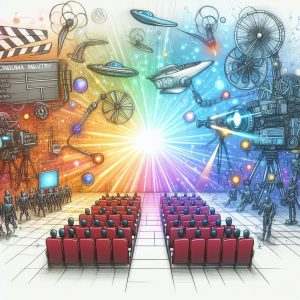In the ever-evolving landscape of technology, artificial intelligence (AI) is making its presence felt in every facet of our lives. From self-driving cars to healthcare, AI is reshaping industries, and the culinary world is no exception. As we step into the future, the intersection of AI and cooking promises a revolution in how we prepare, experience, and enjoy our meals. Let’s delve into the exciting future of cooking and the profound impact AI is set to have on this ancient art.

- Personalized Culinary Experiences:
One of the most significant impacts of AI on cooking is the ability to tailor culinary experiences to individual preferences. AI algorithms can analyze data on dietary restrictions, preferences, and nutritional needs to create personalized recipes. Imagine a world where your AI-powered kitchen knows your taste preferences, health goals, and dietary restrictions, and crafts a menu that suits your needs perfectly.
- Smart Kitchen Appliances:
AI is ushering in a new era of smart kitchen appliances that can streamline the cooking process. From smart ovens that adjust cooking times based on the weight and type of food to intelligent refrigerators that track expiration dates and suggest recipes based on available ingredients, these appliances are transforming our kitchens into high-tech culinary hubs.
- Recipe Generation and Innovation:
AI algorithms are capable of analyzing vast amounts of culinary data, identifying trends, and generating innovative recipes. This can lead to the creation of entirely new dishes and flavor combinations that may have never been discovered through traditional methods. Chefs and home cooks alike can harness AI to push the boundaries of culinary creativity.
- Precision Cooking and Automation:
AI-powered devices can ensure precision in cooking by monitoring temperature, humidity, and other variables in real-time. This leads to consistent and perfectly cooked meals every time. Automation of routine tasks such as chopping, stirring, and monitoring can free up time for cooks to focus on more creative aspects of the culinary process.
- Enhanced Food Safety:
In the future, AI will play a crucial role in ensuring food safety. Smart sensors can detect contaminants, spoilage, or improper storage conditions, preventing foodborne illnesses. AI-powered supply chain management can also trace the origin of ingredients, providing consumers with transparent information about the food they consume.
- Virtual Cooking Assistants:
Imagine having a virtual sous-chef guiding you through every step of a recipe. AI-powered virtual assistants can provide real-time instructions, suggest ingredient substitutions, and even offer cooking tips based on your skill level. This not only enhances the cooking experience for seasoned chefs but also makes it more accessible for beginners.
- Culinary Education and Skill Enhancement:
AI can democratize culinary education by providing personalized tutorials and training programs. Whether you’re a novice cook or an experienced chef looking to learn new techniques, AI can tailor learning experiences to your skill level and preferences.
- Cooking is an ancient human activity that has evolved over time with the development of technology, culture, and society. Cooking is not only a way of preparing food, but also a form of art, expression, and communication.
- The future of cooking may involve more automation, innovation, and personalization. Some examples of emerging technologies that could transform cooking are:
- AI cooking machines: These are devices that can cook food based on recipes, preferences, or commands. They can also learn from feedback and improve their performance over time. Some examples of AI cooking machines are Moley Robotics, Nymble, and Chef Watson.
- 3D food printing: This is a process of creating food by depositing layers of edible materials. It can create complex shapes, textures, and flavors that are difficult or impossible to achieve by conventional methods. Some examples of 3D food printing are [Foodini], [Choc Edge], and [BeeHex].
- Smart kitchen appliances: These are devices that can connect to the internet, communicate with each other, and provide various functions such as monitoring, controlling, or optimizing cooking processes. Some examples of smart kitchen appliances are [Samsung Family Hub], [Anova Precision Cooker], and [June Oven].
- The impact of these technologies on the jobs of chefs could be positive or negative, depending on how they are used and adopted. Some possible scenarios are:
- Complementing: The technologies could enhance the skills, creativity, and efficiency of chefs, allowing them to create new dishes, cuisines, and experiences. The technologies could also free up chefs from mundane or repetitive tasks, giving them more time and energy to focus on the quality and artistry of their work.
- Competing: The technologies could replace or reduce the need for human chefs, especially in mass production, fast food, or standardized settings. The technologies could also lower the barriers to entry and increase the competition in the culinary field, making it harder for chefs to stand out or earn a living.
- Collaborating: The technologies could create new opportunities for collaboration and innovation between chefs and other stakeholders, such as customers, suppliers, researchers, or developers. The technologies could also foster a culture of sharing and learning, where chefs can exchange ideas, recipes, or feedback with each other or with the public.
Conclusion:
The future of cooking with AI is a tantalizing blend of innovation, efficiency, and personalization. From personalized recipes to smart kitchen appliances and virtual cooking assistants, AI is poised to revolutionize the way we approach food. Embracing these technological advancements not only enhances the culinary experience but also opens up new possibilities for creativity and exploration in the kitchen. As we savor the flavors of the future, one thing is certain – the fusion of AI and cooking is set to create a delectable feast for the senses.


